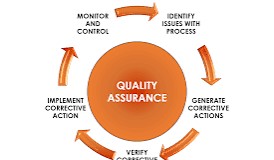Quality assurance (QA) is the term used in both manufacturing and service industries to describe the systematic efforts taken to assure that the product(s) delivered to customer(s) meet with the contractual and other agreed upon performance, design, reliability, and maintainability expectations of that customers
Quality Asurance is a broad process for preventing quality failures. The QA team is involved in all stages of a product's development: production, testing, packaging, and delivery. In contrast, quality control (QC) is a narrower process. QC focuses on detecting mistakes, errors, or missed requirements in a product.
At the following charts we show quality assurance process and charts:

Generally, quality refers to reliability, efficiency and good performance and seeks to reach all stakeholders’ satisfaction, as this is the major factor that defines the requirements on which the organization will finally focus on.
In Marine filed ship, owner, management, RO and administration, PSO are engage with quality assurance and following concept are very important
- SMS are important
- Shipping companies become High Reliability Organizations.
- Safety Culture Safety Climate
- Safety Management: Measuring Maturity
- Quality is important among shipping organizations
- Audits are important
- Learning about Safety Surveys
- Evaluating a Crew Resource Management training
- incident reviews can be a useful tool
Safety Management: How to define and measure KPIs effectively
Marine quality assurance (MQA) is the systematic process of ensuring that marine vessels and operations meet all applicable safety and environmental standards. MQA is essential for improving productivity in the marine industry, as it helps to reduce the risk of accidents and incidents, which can lead to costly delays and disruptions.
There are a number of different ways to improve productivity in the marine industry through MQA. One way is to implement a safety management system (SMS). An SMS is a structured framework for managing safety risks. It helps to identify, assess, and control hazards, and to ensure that safety procedures are in place and followed.
Another way to improve productivity through MQA is to conduct regular quality assurance audits. These audits help to identify and address any potential problems before they lead to accidents or incidents. Audits can be conducted internally or by an external auditor.
In addition to SMS and audits, there are a number of other MQA practices that can help to improve productivity in the marine industry. These include:
Training: Providing employees with the necessary training to safely and efficiently perform their jobs.
Maintenance: Ensuring that vessels and equipment are properly maintained and in good working order.
Communication: Maintaining effective communication between employees/seafarers and management.
Documentation: Maintaining accurate and up-to-date records of all vessels and operations. This also borders on removing obsolete documents when outdated.
By implementing and complying with MQA practices, marine operators can improve productivity in a number of ways. For example, MQA can help to:
Reduce the risk of accidents and incidents, which can lead to costly delays and disruptions.
Improve the efficiency of operations by reducing the need for rework and corrective action.
Enhance the reputation of the company, which can lead to new business opportunities.
Attract and retain qualified employees.
In short, MQA is an essential part of improving productivity in the marine industry. By investing in MQA, marine operators can create a safer, more efficient, and more productive workplace. By investing in MQA, marine operators can create a safer, more efficient, and more productive workplace. This can lead to significant cost savings, increased revenue, and improved profitability.

